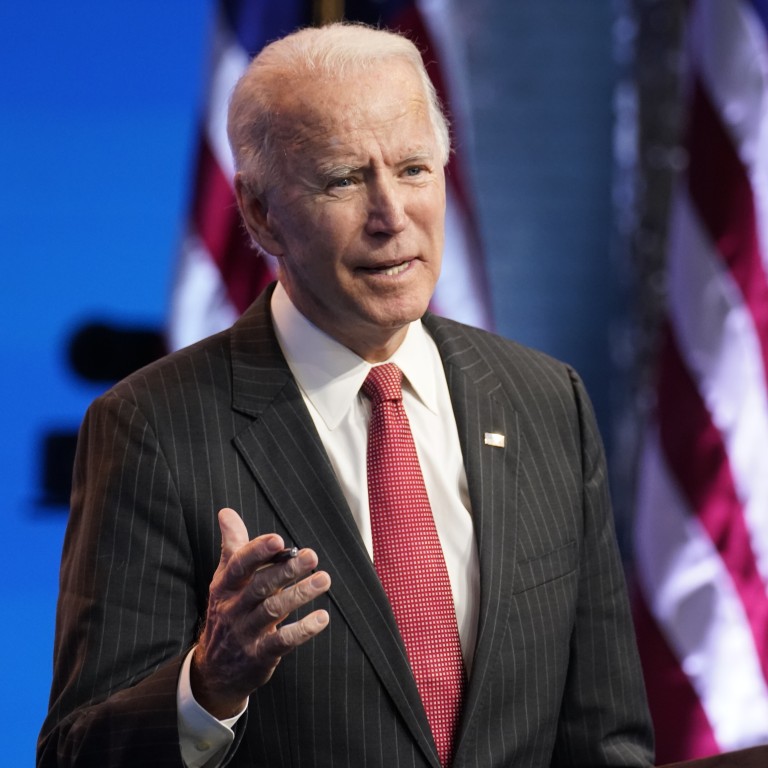
China-EU investment talks: both sides upbeat in public but quiet doubts in Beijing about Biden effect
- China’s signing on to RCEP and 34th round of talks to hammer out Comprehensive Agreement on Investment bring positive messages
- But China observers say a more Europe-friendly US president may tilt the balance and cause the EU to be less willing to compromise
China and the EU held their 34th round of talks this week, with both sides saying advances had been made.
Nicolas Chapuis, EU ambassador to China, told the South China Morning Post the talks were an “at advanced stage”.
“We remain committed, as agreed by our leaders, to closing the remaining gaps before the end of the year. As the leaders noted, high-level political engagement would be required within the Chinese system to achieve a meaningful agreement,” he said.
On Friday, China’s Ministry of Commerce issued a brief statement unchanged from previous comments, saying only that both sides had discussed the remaining problems on the text as well as market offer lists, and that positive progress was made.
It remains to be seen what will be achieved on market access and sustainable development, including environment, labour rights and social responsibility.
The latest talks were held after the US presidential election – the victory of Democratic nominee Joe Biden was cheered by Europeans hoping for a stronger cross-Atlantic alliance – and the signing of the RCEP, a China-backed free-trade deal in the Asia-Pacific region.
Despite the buoyant tone from officials of both sides, China observers are concerned that the US election result may reduce the EU’s political willingness to compromise in the talks.
China pledges expanded trade with EU but stops short on market access
They said Biden, regarded as an Atlanticist – that is, supporting a close relationship between the US and European countries – is widely expected to repair America’s relationship with Europe. As a result, China face a more coordinated effort from developed countries, pressuring it to further shift on market access and structural changes and nudge it to align with international norms.
“A looming Biden administration is likely to have a subtle influence on the China-EU negotiations, which may offer more leverage for the EU in the negotiation,” said Cui Hongjian, director of European studies at the China Institute of International Studies.
Cui said the election result put the EU in a better position in the trilateral trade relations and put more pressure on China. He said major concerns for the talks were the EU’s weakened political will to negotiate and its resistance to compromise.
“China is willing to cooperate but the EU is demanding more. We hope to meet halfway but it rejects and insists we have to meet at their end,” he said.
“Negotiations should be equal, instead of unilateral compromise by one side,” he said. “There is not much left unsettled at the technical level, and the rest is largely to be decided by political decision.”
Given uncertainties about the power plays of major countries after the election of a new US administration and the state of the global economy next year, observers also called for no further delays for the talks.
“We should be ambitious in reaching a high-standard deal which, to some extent, is to lay down rules for the future [in economy and investment],” Cui said.
RCEP a ‘wake-up call’ for Europe and the US to unite against China
On November 4 President Xi Jinping told the opening ceremony of the third China International Import Expo in Shanghai that China would expedite the investment treaty talks with the EU.
Joerg Wuttke, president of the European Union Chamber of Commerce in China, said RCEP showed that China had the appetite to create more favourable trade conditions with its partners but that regional deal would not affect the talks between China and the EU, formally known as the Comprehensive Agreement on Investment (CAI).
“A successfully concluded CAI hinges upon China making stronger offers on market access and sustainable development that can be accepted by the EU,” he said.
The China-EU relationship has taken hits this year because of the coronavirus pandemic and human rights issues, such as in Hong Kong and Xinjiang, which led the European bloc to toughen its stance regarding the sustainable development package.
Cui warned that bringing politics into negotiations might weaken technical solutions for specific economic questions.
“We should depoliticise economic issues. The most successful experience over the past four decades between China and Europe is that they chose to set aside political differences,” he said.
Concluding the seven-year investment treaty talks would pave way for bilateral free-trade agreement talks and the next five-year strategic plan between Beijing and Brussels could be finalised.

